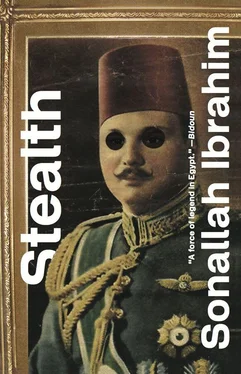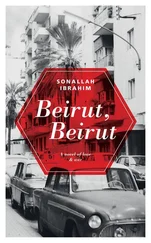Maged Effendi pushes himself to his feet: “Pardon me, everyone. I have to go before she calls me.” He leaves the shop in a hurry. I take back my chair. The turbaned sheikh says: “Real girls can’t find husbands anywhere, and he goes and marries a genie.” Refaat unfolds his copy of Al-Masri. He flips through its pages, then sees something and stops. “Listen to what Duriya Shafiq is writing: ‘The danger of spinsterhood is haunting the young women of Egypt because its men are on strike against marriage.’ ” The sheikh says: “That woman has gone too far. Ladies are crowding men out of jobs. The last straw is that girls from good families are being hired as airline stewardesses.”
Hajj Abdel ’Alim leans over to father and whispers something. Father answers back: “She just won’t do. The whole time she sits on the balcony holding a Coutarelli cigarette. She can’t cook or clean. She gets a jar of water and throws it on the floor and that’s that. She thinks she’s still out in the countryside, throwing water around to get the dust to settle.” A minute later, he adds: “Today I yelled at her. She sat there jabbering all day. I couldn’t understand a damn thing.”
Abdel ’Alim suggests we all go outside because the shop has become stuffy. Abbas takes our chairs and lines them up on the pavement near the entrance. The light thrown across from the chemist’s shop sparkles around us. I get a half-piastre from father and go over to the shop to buy a Robson, a round piece of liquorice-flavored sweet with a blue chickpea in the middle.
When I get back, I find Dr. Aziz in my seat. His huge belly hangs over the top of his trousers. I stand between father’s knees. The doctor asks me about school. Father complains to him that I’m a picky eater. The doctor suggests that I drink Ovaltine and take vitamins. Father says: “I’m sick too. I have dizzy spells and I can’t get up from the bed.”
“Come by my clinic and I’ll take your blood pressure.”
Father asks Hajj Abdel ’Alim about the landlord’s promise to unlock the public toilet and let people use it. Abdel ’Alim says that he has spoken with them but it hasn’t done any good. He adds: “Why don’t you go use the hammam in Al Husseiniya?” The turbaned sheikh shakes his head: “Respectable people don’t go there. Don’t all of you know about what goes on there?”
A fat priest wearing black robes comes up and joins us. His head is covered with something that looks like a plate with dark cloth wrapped tightly around it. He asks Refaat: “Has anyone read the new poem by al-Aqqad?” Father asks: “What’s it about?” “He sings the praises of the lips of the actress Camilia, the one that Akhbar al-Youm calls ‘the warm mouth.’ ” Dr. Aziz says that she has become the king’s mistress. Hajj Abdel ’Alim says: “Poor Queen Fareeda.” Refaat says that there was a watermelon seller calling out to the passers-by: “Royal watermelons!” Someone buys one, and the seller splits it open for him, it turns out to be a pumpkin, at which the seller explains: “Royal — King Farouk — watermelons.” Everyone laughs and I realize that it’s a joke.
I leave my place and turn around so that I’m behind Dr. Aziz. I look down at the newspaper in his hand. There’s a picture of an open police van with several young men inside being guarded by soldiers. The van is moving down the middle of the street. A Sawaris car being pulled by two donkeys tilts to the side. Refaat Effendi says: “The trials of Hussein Tawfiq and Anwar Sadat are almost over. After that, it’ll be the communist’s turn.”
He reads one of the headlines on the side columns: “The Egyptian Government Takes over the al-Qantara to Haifa Rail Line from the English.” I pull my head away when he folds up the newspaper. I peek inside the upper pocket of his suit coat where he keeps a white handkerchief. He has an uncovered fountain pen in it and there’s a huge ink spot on the end of the handkerchief. He says in an annoyed tone of voice: “The Jews are getting ready to fight, and we’re in our own little world. The government goes on its winter break then starts planning for summer vacation, and the leaders keep talking about something they call ‘positive steps,’ but none of us has a clue what ‘positive steps’ means in the first place.”
Hajj Abdel ‘Alim lets out an “ahem.” He says that people have lost trust in the political parties and their leaders.
Refaat Effendi gets ready to defend the Wafd Party and its leader, Mustafa al-Nahas. Father turns to him and says that he wrote a letter of complaint about the way social security payments were disbursed and sent it to Al Ahram, but they didn’t publish it. He explains that he took a big advance from his retirement money under a plan in which he could pay back the advance in monthly payments. Now the advance is all paid back and they’re still taking the payments. “It’s worse than usury. I’m thinking about suing the government.” The lawyer asks him: “When you asked for the advance, did you know that they’d keep taking payments out forever?” Father says that he needed the money badly at the time. Then the lawyer speaks in a decisive voice: “It’s a contractual agreement between you and the government. You agreed to their conditions. The contract is legitimized by the parties.” He crosses his legs, then adds: “Anyway, we can make a claim on the basis that the contract is punitive.”
Father turns to the priest: “Tell us, your holiness, when do we get out the Ouija board?” They sit around rocks made into a circle on the ground. Inside, there are triangles, squares, and strange words. The priest reads in a raised voice from a book as they watch the shapes. Father passes dishes of rice pudding around.
The turbaned sheikh makes a show of his anger. Hajj Abdel ’Alim turns to him: “God gave our lord Solomon use of the djinn. We’re just going to speak with djinn that are Muslim believers. We’re not asking for anything that’ll corrupt us either. We just want it to raise the treasure hiding under the earth’s surface up for us.”
Father talks about what happened when he called on the servant of the “Latif,’ or holy God. He made a habit of doing it every night. Finally, he heard a bump in the living room over the sideboard, and an angry voice came to him: “What do you want?” And he was so scared that he didn’t answer, so the servant never came back after that.
Dr. Aziz says good-bye and gets up to leave. Hajj Adbel ’Alim asks him: “Are you planning on listening to the Um Kalthoum concert?” Father asks what her new song is about. The Hajj answers him: “It’s called ‘I Could not have a Generous Heart.’ ” The doctor says he will listen to the concert at home.
They chat about Hajj Mishaal. Abdel ’Alim says that he sits around counting out 100 pound banknotes the way ordinary people count change out from small bills. The turbaned sheikh adds that he traded in people’s salvage goods before the war.
The fruitseller who walks around the quarter passes by. He calls out that he has oranges from Jaffa. Father buys two okas’ worth. He tells Refaat Effendi: “Who knows when we’ll see these again?” We get up after a while. The entrance to the house is dark, as always. Our apartment too. There is a faint light at the entrance to the storage room, like the glow from a candle or an oil lamp. Father knocks on the door. He takes out the key and opens it. The door to our room is open, but the room is pitch black. He calls out: “Um Muhammad!” but she doesn’t answer. He calls her again. I hang on to his clothes. We go into the room and he turns on the light. He comes back out. I follow him. He wanders through the nooks and crannies of the apartment, calling out: “Um Muhammad.” There is no sign of her. We go back to our room. He looks around for her bundle and cannot find it. He says: “The old crone has taken off.”
Читать дальше












